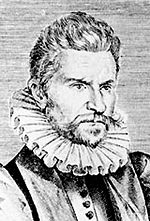Robert Garnier
Robert Garnier (* 1544 in La Ferté-Bernard , † September 20, 1590 in Le Mans ) was a French lawyer and author . His morally and politically educational pieces use rhetorically demanding Alexandrians predominantly from ancient times and are considered the high point of humanist theater in France.
Life and work
Garnier studied law in Toulouse , where he also began to work in literature. He first wrote poetry in the style of the Pléiade school; however, his collection of poems Plaintes amoureuses de Garnier from 1565 seems lost. In 1564 and 1566 he received annual prizes from the Toulouse Académie des Jeux floraux (A. der Blumenspiele) for two longer poems in which he lamented the civil wars that broke out between Catholics and Protestants in 1562 and, from a Catholic perspective, wished for the return of peace and order. In 1565 he was active on the occasion of a visit by the young King Charles IX. in Toulouse as a copywriter of greeting inscriptions and author of three welcome sonnets .
In 1567 he was admitted to the parlement of Paris, where he introduced himself with the royal hymn de la monarchie . In 1569 he became a high-ranking judge at Le Mans and finally a member of the Council of State under King Henry III in 1586 . He was thus a typical representative of the newly emerging class of the official nobility (“noblesse de robe”) between the bourgeoisie and the nobility, from which many authors emerged in the next 200 years.
Garnier wrote eight pieces between 1569 and 1583, the actions of which are based on given material and are set in the more or less distant past, but with a view to their own time, i.e. H. the turmoil of the Wars of Religion , are updated.
The first six pieces were tragedies and were inspired by the ancient Greek and Roman authors Euripides and Seneca : Porcie (1568), Hippolyte (1573), Cornélie (1574), Marc-Antoine (1578), La Troade (1579) and Antigone (1580).
In 1582, in a short period of peace, Garnier wrote the more optimistic love drama Bradamante , which processed an episode from Ariosto's verse epic Orlando furioso . At the same time it introduced the genre tragic comedy in France and was the first and for a long time the last French play whose plot is set in the Middle Ages.
Probably the best and most successful piece by Garnier was his last: the tragedy Les Juives (Die Jüdinnen, 1583). It takes its material from the Bible and is about the cruel punishment of the rebellious Jewish king Sedecias by the conqueror Nebuchadnezzar . It hereby refers to the brutally suppressed uprisings of the French Protestants against the kings who remained Catholic during the wars of religion (the author did not live to see the end of 1598).
Although hardly known today, Garnier is considered the most important French playwright of the 16th century. With his reference to ancient materials and the ancient form of tragedy, he followed, like his older colleague Étienne Jodelle , a fashion and teachings that had come from Italy the Pléiade group, as z. B. 1549 formulated by Joachim Du Bellay . Not least thanks to Garnier, plays in antiquity became a matter of course in French theater. His Marc-Antoine was used as a source of inspiration by Pierre Corneille for La Mort de César and Hippolyte by Jean Racine for Phèdre .
Garnier's wife (since 1573) Françoise Hubert was a valued poet of her time.
Works
- 8 plays after the edition Paris 1585 re-edited. in 4 volumes by W. Förster, Heilbronn 1885.
(In detail: Porcie , 1568; Hippolyte , 1573; Cornélie , 1574; Marc-Antoine , 1578; La Troade , 1579; Antigone , 1580; Les Juives , 1583; Bradamante , 1582)
- Plaintes amoureuses (Toulouse 1565, lost);
- Hymn de la monarchie (Paris 1567);
- Élégie sur le trépas de Ronsard ;
- Le tombeau de messire Desportes
Web links
- Literature by and about Robert Garnier in the catalog of the German National Library
- Article in Gert Pinkernell: "Names, titles and dates of French literature" (source)
| personal data | |
|---|---|
| SURNAME | Garnier, Robert |
| BRIEF DESCRIPTION | French poet |
| DATE OF BIRTH | 1544 |
| PLACE OF BIRTH | La Ferté-Bernard |
| DATE OF DEATH | September 20, 1590 |
| Place of death | Le Mans |
